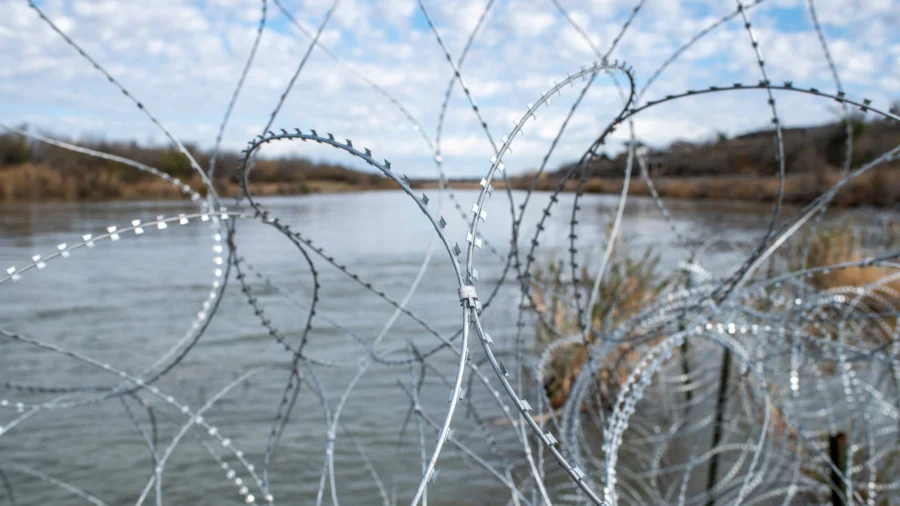Tennessee Gov. Bill Lee is the latest Republican governor to deploy a contingent of his state’s National Guard troops to the U.S. southern border to help block illegal border crossings.
During a visit to the Texas border town of Eagle Pass last month, Mr. Lee announced his intent to authorize two new rounds of troop deployments to the border. On Saturday, he made good on that vow, meeting with a group of 50 Tennessee National Guard soldiers who will take on the border mission.
“As America faces the most severe border crisis in decades, TN is showing the rest of the country what it means to lead,” the Tennessee governor said. “Today, I joined TN National Guard members who will soon deploy on a voluntary mission to secure the Southern border as the federal government fails to act.”
This troop deployment is not the first time Gov. Lee has ordered Tennessee state active-duty troops to help protect the border against illegal crossings. Over the past three years, his administration has hundreds of troops along the border. Most recently, 125 members of the Tennessee National Guard’s 1175th Transportation Company were deployed in a yearlong mission in which they assisted the U.S. Customs and Border Protection by operating mobile surveillance sites and monitoring surveillance cameras to detect illegal border crossings.
Though they’ve provided some assistance for federal-level border missions, several Republican governors have also worked to directly assist Texas Gov. Greg Abbott in a separate border security effort that has often placed him at odds with President Joe Biden’s administration.
Arguing the Biden administration wasn’t doing enough to block illicit crossings between the designated ports of entry along the southern border, Gov. Abbott launched Operation Lone Star in 2021 to block such crossings at the state level and to intercept cross-border drug smuggling efforts. Throughout Operation Lone Star, the Abbott administration has attempted to place physical barriers, including a floating barrier along the Rio Grande, and razor-wire along the Texas side of the river.
Red States Continue Border Deployments Amid Federal Impasse
The Biden administration has had success getting federal courts to grant them the right to remove physical barriers installed under Operation Lone Star. Questions about border enforcement remain pending before the federal court system, but in January the U.S. Supreme Court ruled that the Biden administration could continue removing these physical barriers. Even after this Supreme Court, Mr. Abbott has continued ordering the installation of new physical barriers along the southern border.
Mr. Lee is among 25 Republican governors who pledged in January to continue assisting Operation Lone Star in the face of setbacks in the federal courts.
On Feb. 1, Republican Florida Gov. Ron DeSantis pledged up to 1,000 Florida National Guard troops to deploy to Texas, along with dozens more State Guard and Highway Patrol members, to assist Operation Lone Star.
A week later, Republican Louisiana Gov. Jeff Landry announced his state would deploy 150 National Guard troops in three 50-man rotations over 90 days beginning sometime in March.
On Feb. 9, Republican Indiana Gov. Eric Holcomb announced about 50 Indiana National Guard troops would deploy in mid-March to assist Operation Lone Star.
On Feb. 20, South Dakota Gov. Kristi Noem, another Republican, pledged 60 National Guard troops from her state to deploy to Texas sometime this spring. That same day, Republican Missouri Gov. Mike Parson announced his state would send 200 National Guard soldiers and 22 state highway patrol troopers to Texas to assist Operation Lone Star.
In recent months, President Biden and Congress entertained talk of new border security efforts but no deal has been reached. In October, the president outlined a $13.6 billion border security request, which he attached to a larger $106 billion supplemental spending bill that included about $61 billion in additional Ukraine-related funding, $14.3 in Israel-related funding, and billions more for humanitarian aid projects and alliance building in the Indo-Pacific region.
The border security provisions of President Biden’s supplemental laid out funding to hire 1,300 additional border patrol agents, 1,600 new asylum officers, and 375 new judge teams, along with funding for new technology to detect drug smuggling. Throughout the Biden administration, many Republicans have attributed the surge in border crossings to the changes in border enforcement policy made by the Biden administration. Those Republicans countered President Biden’s border spending proposal with calls to adopt more stringent policies governing when people arriving at the border can claim asylum and be released into the United States with pending immigration claims.
Senate negotiators released a nominally bipartisan proposal for some border and immigration policy changes, but many congressional Republicans rejected the deal as insufficient. The Biden administration has, in turn, blamed congressional Republicans for rejecting what it characterized as a tough immigration bill, and accused those Republicans of working at the behest of former President Donald Trump, the Republican 2024 frontrunner, to leave the border security issue unresolved before the 2024 election.
“Congressional Republicans killed the toughest, fairest bipartisan border security deal in a generation,” White House Press Secretary Karine Jean-Pierre said in a Feb. 14 press conference, after the Senate border deal collapsed. Ms. Jean-Pierre suggested President Trump’s criticism of the Senate border proposal was the decisive reason the bill failed to garner Republican support.

